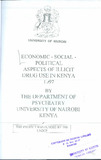| dc.description.abstract | The issues relating to illicit drug production, trafficking and consumption have been a
subject of three major conventions of the United Nations (UN.): the U.N. (1961).
Single Convention on Narcotic Drugs; later amended by the 1972 protocol, the UN.
(1971) Convention on psychotropic substances and the UN. (1988) Convention'
Against illicit Traffic in Narcotic Drugs and Psychotropic Substances. Pursuant to the
resolutions adopted by these UN. conventions, most govemments of the UN.
member states have already ratified them Kenya as a member state of the UN. has
not only ratified these conventions but has already originated national legislation along
these UN. resolutions. Hence the Narcotic Drugs and Psychotropic Substances
(control) Act - 1994 was enacted by the Parliament of the Republic of Kenya and
published. (Kenya Gazette Supplement No. 41 - 1994). It is already operational.
This legislation details the regulations pertaining to the production, trafficking,
possession and consumption of narcotic drugs, and psychotropic substances in Kenya.
The penalties related to infractions to these regulations are also detailed, therein. To
monitor the activities related to this act, the Kenya Government established "The
Anti-Narcotics Unit" within the Criminal Investigations Department (C.LD) of the
Kenya Police. It is this Unit which is charged, with the responsibility of enforcing this
Parliamentary Act through aut Kenya and beyond. To this end, the services of the
regular police an patrol, concerned parents, guardians, siblings, friends, peer
members, schools, churches, health care units, club members, members of the general
public and most importantly, the local Public Administration, have also played a major
'-ale in the implementation of the provisions of this act. Most significant was the
Appointment or an- Inter-Ministenal Drug--C::=oarainating-ConIDiittee"- with "The
Solicitor - General" as the Chairman and with members drawn from most concerned
Government Ministries and other stake holders in the drug issue. (The Kenya Gazette
- Notice No. 4048 af26 July 1996).
This committee is charged with the responsibility of defining, promoting and
coordinating government Policy and activities far the control of drug abuse and drug
trafficking along the three UN. conventions as well as updating and implementing the
Narcotic Drugs and Psychotropic Substances (Control) Act, 1994.
rile ame committee is also ell :sed with the responsibility of establishing a viabl
data bank and analysis of dru abuse and trafficking at the national level. TIt
committee has already establisl. .d a secretariat and plans to uold the first worksho
are already at an advanced stage (Jackobam, 1997).
At the international level, the U.N. has established the United Nations Intemation:
Drug Control Programme (UNIDCP) and it's Global Regional Offices which gathe
much of its data on illicit drugs supply and demand from Member States through th
Annual Report Questionnaire (AR.Q). Though comprehensive, the ARQ'
consistency, regularity and comprehensiveness of the Member State's responses var
considerably from year to year. Hence significant data base gaps do exist. This i
because most activities involving illicit drugs are clandestine hence data collection 0]
these activities is not easy. Therefore, until efforts are increased to improve th:
gathering and analysis of information on country level trends, understanding of th:
complex dynamics of illicit drugs at the global level will be limiteci (World Drug
Report, 1997).
The drug phenomenon is unique in the way it affects peoples lives: health, politica,
and economic development, crime level in the country and the stability oj
governments. Hence in tackling the drug problem, it is essential first to understand its
relationship with other issues affecting the societies. illicit drug abuse prevents
individuals from realizing full personal potential with subsequent limitations of social
development. The social and economic costs of illicit drug abuse places an intolerable
strain on the social infrastru- ~'TI'e of a country. The illicit production-of dr os-diverts
human and natural resources from more productive activities, and weakens the
foundation for long-term economic growth. The power of international drug
trafficking organizations threatens to corrupt and destabilize the institutions of
government. The crime associated with drugs, much of it violent, makes a misery of
many lives. (World Drug Report, 1997).
It is in the light of the aforementioned that a study on the economic, social and
political aspects of illicit drug use in Kenya was conducted ill October ] 997. This
study was sponsored by the U.N.I.D. c.P. and conducted by the Department of
Psychiatry; College of Health Sciences, University of Nairobi. The Department is
therefore extremely pleased and honored to :fill some of the gaps that exist in the
understanding and possible solutions to this problem Such gaps could only be :filled
through community based quantitative research. We have not only described the
problem but have also pointed the way forward, not only for Kenya, but also for the
international community at large. This way forward is implied all along the report and
in the various recommgadations=The Departmenr'has the necessary uman resources,
expertise, experience and ready to help in the implementation of the various
recommendations, including further research and developing training modules for
training of trainers and trainees.
The real credit for this work goes to my most dedicated, "team spirited" staff (and
mends of this Department) who, with highly limited resources, work-ed long 'hours,
used their own resources, sacrificed vacation and own free time to complete this study
at the earliest possible date. This project took place during electioneering and general
elections time in Kenya' and also during vacation time for the University hence the
pressure for time for the project by everybody involved. I am very proud of them
My veJY special thanks go to Dr. D.M. Kathuku, Dr. C. Otieno, Miss Victoria Mutiso
and Miss Caroline Karicho. | en |

